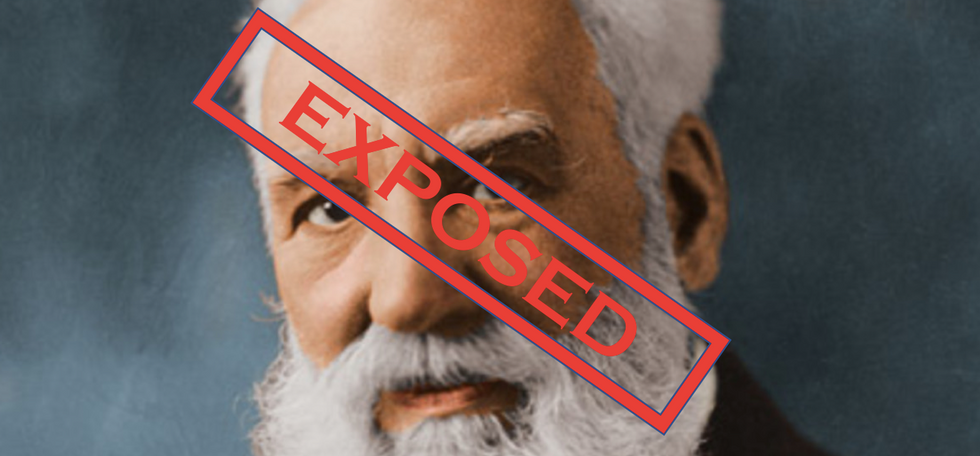Sometimes it seems like history is a giant game of telephone because a lot of it has been misconstrued. For example, in elementary school, I learned a song about Christopher Columbus discovering America.
Unfortunately, in middle school I learned that Christopher Columbus didn’t discover America, the Vikings did. In fact, the Viking ship, led by explorer Leif Erickson, could have arrived 500 years earlier than Columbus.
So, just like that, my mind had to completely rewrite a historical fact, which I had considered to be a given. And, a couple of months ago, it had to do it again.
I was watching an episode of Drunk History, a pretty self-explanatory television show where historians get hammered and (try to) retell historical events.
In that episode, called Inventors, the historian decided to destroy anything I’ve ever known about Alexander Graham Bell, and declare that he actually stole his ideas from another inventor named Elisha Gray.
When presented with this newfound information, I figured I’d better do my research instead of believing the first source I came upon. So, like any good researcher, I turned to Google:
Ah! No mention of poor Elisha Gray, but there was this mystery man named Antonio Meucci. I decided to search him up next. And, to put it lightly, Meucci had a tough life. Meucci was born in Florence, Italy, and began testing early telephone models there. When he and his wife moved to the United States, he was on the Staten Island ferry explosion and received bad burns. While recovering, he discovered his wife had sold everything in his lab for $6.
But Meucci didn’t give up easily, and he improved his prototypes. Because he didn’t have enough money to buy a full patent, he filed a caveat. But, a year later, he didn’t even have the $10 to renew it.
He sent his model and technical details to the Western Union Telegraph company (whose executives were friends and colleagues with Bell), but they never gave him a meeting, and then claimed they lost all of his stuff. Two years later, Alexander Graham Bell filed a patent for the telephone and became a celebrity. Meucci sued and was close to winning when he died.
The one upside to this story is that in 2002, Congress acknowledged Meucci as the inventor of the telephone. But, just like many artists, Meucci is not alive to appreciate the recognition of his work.
But this still doesn’t answer the question, what about Elisha Gray? Well, I did some more research, and it turns out that he and Bell submitted their inventions simultaneously. On February 14, 1876, Gray filed a caveat. The same day, Bell submitted a patent application.
Because Bell’s patent was submitted a few hours before Gray’s, he was recognized as the first inventor of the telephone. Sounds like a simple conclusion, but it isn’t over yet; many believe that there was some fraud in the patent office, and even by Bell, to make it seem like Bell was first.
Additionally, when Bell’s notebooks were finally published in 1999, there were a couple of things that didn’t add up. For a while, Bell was attempting to create the telephone using electromagnetic sound transmission. But suddenly, on March 8th, 1876, he switched to liquid transmission, and two days later, he made the first ever telephone call.
Coincidentally, right before the switch, he’d visited the patent office for 12 days. To top it off, Elisha Gray’s caveat included liquid transmission.
And if you still aren’t convinced that this entire situation isn’t sketchy, on May 22, 1886, a former Washington patent examiner named Zenas F. Wilber swore in an affidavit that Alexander Graham Bell had bribed him to award him the patent for the telephone over Gray, and even give him a peek at Gray’s caveat.
So, in the end, both Elisha Gray and Antonio Meucci deserved the patent just as much as Alexander Graham Bell did. And after my long and difficult Google investigation, I felt a little let down if I’m going to be honest.
It isn’t as if I used to sit around all day and daydream about Alexander Graham Bell, but it’s always a little weird to find out that a historical person that you’ve always respected turns out to be an asshole.
We have a weird relationship with our historical figures, in that many of them tend to be idolized. We forget that they’re people who, while still doing fantastic things for humanity, make a lot of mistakes. And sometimes, they don’t even deserve the recognition we’ve given them.
For example, in his work Politics, Aristotle wrote, “[T]he relation of male to female is by nature a relation of superior to inferior and ruler to ruled."
Einstein cheated on his wife… with his cousin.
Thomas Edison stole many of his ideas from others and claimed them as his own.
And, unfortunately, Alexander Graham Bell was not entirely the telephone-inventing genius we’ve made him out to be.




















